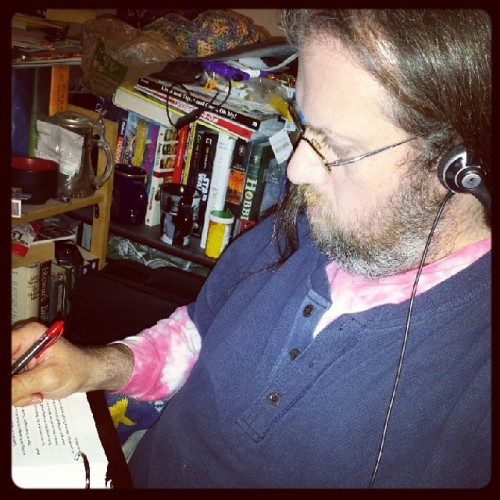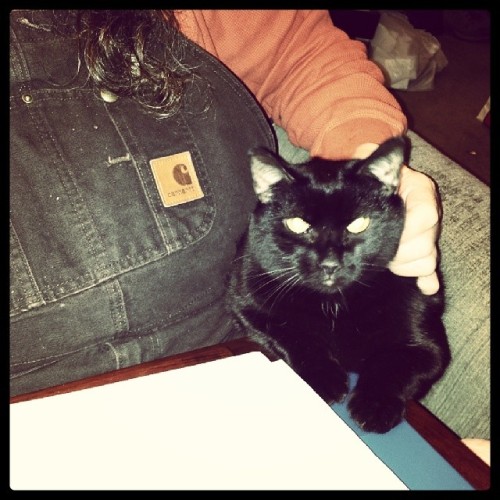Pages on this Blog
Friday, January 31, 2014
Thursday, January 30, 2014
Something for Thursday
This is a rough time of year for astronauts, it seems -- the dates of the three fatal space-launch accidents are all within days of each other. I salute their sacrifice and zest for exploration.
Wednesday, January 29, 2014
A Random Wednesday Conversation Starter
On a scale of 1 to "I'm moving to Barbados and I'm not even packing my stuff, I'll buy new stuff when I get there", how sick are YOU of this deep freeze? (I usually try to not be quite so location - specific with these posts, but I'm too cold to think of anything else right now.)
Tuesday, January 28, 2014
Farewell Pete Seeger
Walk the stars, Pete Seeger!
Oooooh, stuff on the teevee!
Person of Interest will be getting its own post. Suffice it to say that it's become my favorite currently-running show, and I think it's terribly underrated.
:: Castle continues chugging along. It's a very comfortable show now, especially since it pretty much wrapped up the storyline about Beckett's mother's murder. Castle is, more than anything else, that warmly welcome show that I look forward to every week simply because it's so comfortable. No real new ground is being broken here, but so what? I still like these characters and I like seeing what happens to them.
This season did get off to a rough start, with Beckett going to the FBI and Castle having to figure out a long-distance relationship. I did like how the marriage proposal wasn't made into a long-standing plot point; I liked how Castle says "This isn't my way of trying to get you to stay in New York; if we have to move for your job, then that's what we do". I liked the honesty with which the writers handled that, and I also liked the degree to which the writers clearly know their characters, in the way they wrapped up Beckett's FBI experiment. They know that Beckett's concept of justice – find the criminal, and put them away – doesn't really work in agencies like the FBI, where often an agent's day-to-day work doesn't yield a big-picture view of where the "justice" is. That was well done.
Less well-done were the FBI-based episodes themselves, since the writers had to figure out ways to shoehorn our old NYPD friends into the stories, because they are, after all, cast regulars under contract. This was another example of the Castle writers being somewhat constrained by the realities of their show, as a mid-level show with decent ratings. No killer budget, but also the standard "rules" that come with being on a network. There's only so far they seem able to push their storytelling, and there are times when you can really feel the Castle writers pulling their punches. The FBI episodes were a good example of that.
Still, love the show!
:: The Big Bang Theory is also becoming comfortable – maybe a little too comfortable. It still makes me laugh – the Thanksgiving episode was utterly hysterical – but short of actual character growth or some new way of shaking the dynamic, the show is often twenty minutes of "Let's make fun of nerds!" and "Ha ha, Sheldon doesn't realize that Amy's been horny for four years" and "Raj is pathetic" and "Leonard and Penny love each other but make an awful couple". I just don't know how much more shelf-life this show has. This show needs something to happen. The last big thing to occur were the additions of Bernadette and Amy to the group, and since then, it's pretty much been kind of a struggle.
:: We seem to have finally abandoned Bones, which became embarrassingly bad last year and started off this year even worse. They finally resolved the Palant storyline (that guy makes my top five of Worst Teevee Recurring Villains Ever), got Bones and Booth married, and then...who cares. This show was once good, but it's awful now.
:: I honestly don't know what The Mentalist is doing, and I wonder if it's just playing out the string at this point. The Red John storyline limped to a pretty boring conclusion two seasons after it really should have ended (inasmuch as it can even be called a "storyline", as few of its twists and turns through the years ever made any sense), but not before trying to muddy the water with some kind of secret society in the law enforcement ranks and then shifting half the cast to the FBI and moving the show from California to Texas. So now the main attraction seems to be watching a new set of law enforcement people try to figure out how to deal with Patrick Jane's various quirks, which isn't exactly a recipe for the show's long-term future. Frankly, I'll be really surprised if The Mentalist is still around come next fall.
:: Once Upon a Time had a surprisingly good first half this season. In previous years this show has been so inconsistent as to make me crazy. Sometimes the show is amazing, but other times the writers make me want to throw bricks at puppies. This year, with most of the cast sent to Neverland to battle the evil (!) Peter Pan, things were actually a lot more interesting. They did keep that storyline going on just a tad too long, and they still indulge their habit of too many scenes where the villains do nothing but twirl their figurative mustaches whilst saying evil things, and Red Riding Hood was nowhere to be found (nooooo!), but I really did enjoy this season's first half. Most impressively, they actually made Captain Hook into an interesting character! Last year, he was just annoying.
I continue to crush mightily on Lana Parilla and Robert Carlyle. Love those two.
:: I tried to like Hannibal, and I even gave it more than my usual five or six episodes to grab my interest. By the eleventh episode, though, I had to admit that it just wasn't getting there for me. Mads Mikkelson is amazing as Hannibal Lecter, playing him with a kind of "European weirdness" that contrasts with Sir Anthony Hopkins's legendary portrayal. Mikkelson captures the fact that Lecter is, for all his depraved villainy, actually a decent person capable of some degree of caring, albeit on his own very limited and somewhat villainous terms. Mikkelson gives a Lecter who is vulnerable, horrible, calculating, sickening, and friendly.
Unfortunately, the rest of the cast is pretty bland. Hugh Dancy's moods range from "mild brooding" to "maximum brooding"; Laurence Fishburne (an actor to whom I have never warmed very much) basically plays Jack Crawford the same way he tends to play everybody else. The rest of the cast makes absolutely no impression on me, and the show even manages to waste Gillian Anderson in a dreary turn as Hannibal Lecter's psychiatrist.
At first I liked the show's production design, which is often cinematic and spectacular, but as the series went on, I tired of this angle, and I started wondering why, in the show's universe, the news media hasn't taken notice of the incredible rash of deeply theatrical murders taking place in the Baltimore area. It started to feel as if the writers were trying to figure out a more spectacular way for the Serial Killer Of The Week to make his/her work known, so we have the killer who slices his victims' flesh to make it look like they have wings and then poses them as if they are praying angels; then we have the killer who impales his musician victim on a cello; and then there's the killer who builds an enormous totem pole out of corpses he's buried on some beach someplace. This is ultimately what made me turn against the show: its events simply became less and less believable, and the characters weren't interesting or well-portrayed enough (Hannibal himself excluded) to keep me interested in what was increasingly a bit of non-magical dark fantasy. I wanted to like this show, but it's a miss.
:: That's about all for network teevee! Aside from Big Bang Theory, there aren't any comedies we watch regularly – How I Met Your Mother never really won me over (its lead character is insanely boring), and my love of Kat Dennings isn't enough to sustain my interest in 2 Broke Girls. Also, no new show has come along that makes me stand up and say, "Ooooh, we gotta watch that!" So our non-network teevee watching consists of things like Sherlock, The Daily Show, Pawn Stars, and a recent plow-through of Arrested Development in its entirety. (That, also, will get a post of its own.) We're on the lookout for other stuff to watch, so let us know what's good! (Elementary and Sleepy Hollow are no-go. We tried both, although I may give the latter another shot on my own. I'm a bit gunshy, though, as I have not had very good experiences with stuff from the minds of Alex Kurtzman and Roberto Orci.)
That's about it. I'm looking forward to the Neil DeGrasse Tyson revisit of Cosmos, and as always, there are a bunch of shows from yesteryear I need to either continue watching or start watching (Battlestar Galactica, Farscape, X-Files, Millennium). And you never know, I may hear enough interesting things about some new show to jump in at some point.
Monday, January 27, 2014
A writing update
A bit less than halfway through the book, I've cut over 10K words.... #editing #AmWriting, originally uploaded by Jaquandor.
I'm a little less than halfway through applying my red-ink markings to the PRINCESSES IN SPACE II manuscript, and as of last night's bedtime, I had struck over 10,000 words from the book. That's pretty sweet. I'm hoping to eliminate over 20K by book's end, and I may well get there, because -- I hate to admit this, but 'tis true -- the first draft has a lot of flab.
Sadly, I'm unlikely to make my goal of having the draft ready for beta-readers by the Super Bowl, but you never know.
As for other writing, I've shelved everything so I can get through this phase on Princesses II. This isn't really a bad thing, as I took a wrong turn at some point on Lighthouse Boy and need to backtrack yet again. I think I have the right direction in mind, though, so we'll see what happens when I get back to that one.
The next priority, in terms of the Princesses In SPACE!!! (not the actual title) series is to start working toward the book's self-publication, which I still hope to get done toward the end of this year. More updates will follow! 'Tis going to be a hell of a year, friends!
Sentential Links
:: You know what would be cool? Placemats that had losing presidential candidates. (Yeah, because I wanna think about Michael Dukakis when I eat!)
:: For all its archness, for all its knowingness, for all its dark and sardonic and sarcastic humor, Sherlock can be an awfully sentimental show, because one of it’s themes is the beautifully diverse and often perverse ways love takes hold of us. (I cannot comment on Lance's post because I've seen the next two episodes and he has not....)
:: This is one of those stories that I hope are not true but I know that SOMEHOW those Russian numnuts found a way to contaminate a cruise ship with plague rats as some kind of Cold War experiment. (Yeah, we're all friggin' doomed.)
:: I have what I imagine is an annoying habit. Someone says something, and it often leads me to a song. Those references to music in my blogs are not an affectation, or looked up to be hip, it’s just THERE in my head. (Not unlike my ability to relate everything to a movie or teevee show or book quote!)
:: Every day, I will do something that scares me, at least a little, expanding my comfort zone one Fearless Act at a time. Some of these will be small and simple things that anyone can do. Others will be much more difficult. Big or small, I plan to share as many of them as possible with you. (Brand new blog, go check it out! I made contact with Brinna via Instagram and Twitter, along with a whole ton of other writers.)
:: At times like this, it's really hard to see the progress I've made or even tried to make. (SamuraiFrog continues to blog unflinchingly about his battles with anxiety. I'm in his corner.)
:: At this time last year I was out of my mind. And the worst part was that I didn’t know it. It was just another day in the life as far as I was concerned. (I'm also in Sheila's corner. I aspire to her model of uncompromising and personal writing.)
More next week!
Sunday, January 26, 2014
Sunday Burst of Weird and Awesome
:: Someone decided that the signage in the London Underground needed a bit of added weirdness.
:: If you like bad puns about fish, this Twitter exchange is for you.
:: Scared of heights? Don't watch this.
More next week!
Saturday, January 25, 2014
Symphony Saturday
And then came the Third, the Symphony No. 3 in E-flat Major, subtitled the "Eroica".
This was one of those epochal works that pretty much signaled an entirely new way of doing business, a new way of looking at things, an upping of the ante that seemingly came out of nowhere. Here was a symphony more than twice as long as usual, whose first movement alone is as long as many "standard" symphonies. Here was a work that plumbed emotional depths rarely touched by any composer; here was music composed on an epic scale. The premiere of the Eroica has always been one of those events in music history I would like to attend, if anyone were to ever a musical time machine.
Beethoven was quite the idealist and humanist, and the famous story about the dedication of the Eroica is one of the great musical legends. He originally dedicated the symphony to none other than Napoleon Bonaparte, but then, upon learning that Napoleon had declared himself Emperor, an enraged Beethoven is said to have torn away the title page and renamed the work. This story is quite possibly apocryphal, or an enlargement of whatever did, in fact, happen. There is an autograph copy of the score with the original dedication to Napoleon scratched out, however.
The Eroica's epic scale is evident right from the very start, when Beethoven eschews all introductory material in favor of two huge E-flat major chords before immediately stating the melody (which also introduces a hint of chromaticism that was also unusual for the time period). That movement covers an enormous amount of ground, and is immediately followed by a slow movement that is not gentle or lyrical, but is rather a funeral march that is equally epic and vast in scope. The final two movements -- the scherzo and the theme-and-variations finale -- are also uncompromising and original.
Beethoven's Third has never been my favorite of his works, but its power and majesty cannot be denied. It's an amazing work that changed everything. Many musical historians date the beginning of Romanticism in music to this work, and it's hard to disagree with that assessment.
The performance video, by the way, is occasionally marred by a fault in the recording. Don't let this bother you. The performance is wonderful.
Friday, January 24, 2014
Thursday, January 23, 2014
National Pie Day!
Sadly, this is also the day that the Captain and Tennille announced that they are divorcing, which I find quite a bummer. But I can tie that into National Pie Day, too:
Happy National Pie Day, folks!
Wednesday, January 22, 2014
A Random Wednesday Conversation Starter
Hmmm.
Um.
Yup.
[looks at feet]
Um....
[checks phones for messages I know aren't there]
Hmmmm....
[clears throat]
Yeah, I got nothin' today. What's up with you, folks?
Tuesday, January 21, 2014
A couple brief thoughts on "selfies"
I have a hard time seeing selfies as a bad thing, really. I think their explosion springs from a couple of sources: first, the fact that everyone now walks around with a camera on them at all times, thanks to their cell phones. I remember when cameras in phones was the newest thing, and now...aside from those cheap "Makes calls only" phones you see advertised in Parade Magazine -- the cheap ones geared to people who literally don't want to do anything other than make calls with their phones -- do they even make standard phones without cameras in them? No idea. Anyway, a camera is no longer something you have to choose to take with you when you go someplace. It's no longer a case of, "Hey, we're going to Mount Rushmore today! Make sure you pack the camera!" So there's that.
Secondly, I think that selfies are a natural reaction to something that was said of the Internet for years: that as a primarily text-driven medium, it was often hard to discern mood and temperament just via the words on the screen. A joking tone might be missed entirely, and getting to "know" someone without ever seeing their face always had an incomplete feeling. There was a layer of opacity, created by the Internet, through which it could be hard to really determine what a person was like. Not that everybody is pasting selfies to every thing they say, but I do think that as the Internet becomes more and more of a social thing -- and by "Internet" I also mean all the various social networking doodads that are primarily used on mobile devices -- it becomes easier and easier, and this more and more common, to include photos of oneself in one's various interactions.
Anyway, those are my thoughts on selfies. Well, not quite: I'm not sure why more folks don't use their camera app's self-timers, opting instead to photograph their own mirrored reflections, I don't understand the whole "duckface" thing, and really, when you think about it, "selfie" is a kind of goofy word. I think there's a study to be done of the Internet's tendency to reduce its lingo to the shortest possible words, often making up new words entirely if there's not already a short-enough word to do the job.
And no, I'm not including a selfie in this post. Just because.
Monday, January 20, 2014
Sentential Links
:: I turned 40 a few weeks ago. One would think that by this “reasonably adult like age” that I would no longer feel guilty about simple things in life, like, missing an event, right? Wrong.
And it’s time to do something about it. Starting now. (I've been struggling with ditching guilt as well. I'm getting there!)
:: It's not hard to amass a cheap Mr. T collection because he merchandised his image to every dam product one could think of. There is everything from Mr. T puffy stickers to Mr. T lip balm. I was a big fan back in the day but have NOTHING Mr. T related in my home. There is just something very very wrong with that. (Me either....)
:: Yep, there’s nothing more fun than watching an ice bowl or snowstorm… on television. Sitting in your nice warm living room, beer and snacks at your fingertips, a fire roaring, the bathroom only feet away, and the game in high def on a giant flatscreen. The yellow line, replays, close ups, field reporters, coverage from every angle – that’s football.
:: This is me, my friend Mitchell, my friend Jackie. We are in college. 19, 20 years old. We crashed a party at the Biltmore Hotel in Providence, an invitation-only black-tie party on the top floor. I remember us waltzing in, like we belonged there, and no one questioned us or asked to see our invitations. We were determined to be at that party. We had a blast. There was a deejay. We danced. We drank. We knew no one at the party. Did anyone ask us, “So who are you guys?” I don’t remember. We took this obnoxious photo. I look at this photo and think: “Guys, you weren’t invited. Go home.”
:: The question: is the bench Les’s permanent phone background wallpaper, which would explain why Cayla looks so emotionally numb in panel four, or does it just appear when Summer calls, which would explain why she’s so full of rage and frustration that she can’t fully explain?
:: This man will be on the Justice League.
Blurry lines. Evil is very relative. (Wow....)
:: Rest is the key. The day is easier to face when rested. And I've spent years being unable to rest.
Rest and breathe. (SamuraiFrog is doing quite the service in his writings about anxiety, because he's documenting what it's really like to mount that battle. This is important. It really is. I salute his brave writing on the subject.)
More next week!
Sunday, January 19, 2014
Sunday Burst of Weird and Awesome!!!
:: Here's a terrific post about a key scene in one of my favorite movies, Say Anything.
When people think of Say Anything..., the first thing that pops into their head tends to be the boombox scene. That’s understandable—grand romantic gestures are one of the things the movies do exceptionally well, in part because a movie can just cut away and ignore the less stirring aspects. As a thought experiment, try imagining how Lloyd Dobler’s “In Your Eyes” serenade must have ended. The camera dramatically tracks in on him standing there with the boombox held over his head, then moves on to the next scene. We never see the moment when he concludes Diane isn’t going to rush out and fling her arms around him, decides he’s stood there long enough, turns off the music, gets in his car, and drives back home. Now imagine that same moment from Diane’s perspective. See what editing accomplishes? In a way, though, grand gestures are easy. It’s taking the first step that’s truly difficult, and that difficulty is one of the many things that Say Anything..., in all its adorable awkwardness, gets exactly right.
I still consider Say Anything the finest teen romance film ever made.
And by the way, that post is part of a series called Scenic Routes that examines specific movie scenes. I haven't read too much into it, but on the basis of the Say Anything post, it looks like there might be some nifty commentary there!
Also by the way: in the scene discussed above, my favorite touch is Lloyd's ordering of his young nephew into the corner to remain silent while he makes The Most Important Phone Call Of His Life.
:: This looks neat. I won't be doing this at Casa Jaquandor any time soon, though. I shudder to think what our two fat and dumb lummoxes would do to structures like this. Those of us who live our lives in the presence of cats well know how often the stereotype of cats as "graceful and elegant creatures" turns out to be completely untrue.
:: Last week, FOX Sports -- I'm assuming as part of their coverage of the Seattle Seahawks' playoff game -- showed a bit of footage that turns out to be one of those ideas that's so obvious that I can't believe nobody ever thought to do it until now. The idea? Well, you know how at public markets and places where they sell really fresh fish, as in "right off the boat", the workers will through whole fish to one another in a kind-of blue-collar seafood ballet? Well, someone actually attached a camera to the fish itself, so here's what it's like to be tossed about by fishmongers!
I first saw this here.
Stay weird and awesome, Internet! More next week!
Saturday, January 18, 2014
Symphony Saturday
At this point, Beethoven is still very much the Good Little Classicist, still standing firmly in the tradition of Mozart and Haydn, which is why this symphony clocks in at a nice and respectable 25 minutes. You can already hear hints of the independent streak that will lead Beethoven in deeply original and fascinating directions, such as his substitution of a forceful scherzo for the usual minuet. He hasn't quite started to quite push against the boundaries yet, but you can tell that the boundaries won't hold him back. This genial work is where it starts.
Pay special attention to the opening of the fourth movement, which is one of my favorite moments in all of classical music. Beethoven has the orchestra flirt with the major scale, making the music sound almost tentative, as if the orchestra itself isn't sure of what to do -- and then they hit on one of Beethoven's most effervescent melodies as all the confidence comes flooding back. It's one of the most charming moments in music I know, and it stands against the usual stereotypical picture of Beethoven as the moody genius shaking his fist at the heavens.
A special word about the performances I will be using for the Beethoven portion of this feature: they are all taken from the complete cycle of Beethoven symphonies performed at the BBC Proms concerts in 2012, with Daniel Barenboim conducting the West-Eastern Divan Orchestra. This group is a youth orchestra comprised of students of Middle-Eastern background, and it was created not so much to promote peace as to demonstrate the kind of cooperative effort that is the true basis for peace. Maestro Barenboim has said of the orchestra:
The Divan is not a love story, and it is not a peace story. It has very flatteringly been described as a project for peace. It isn't. It's not going to bring peace, whether you play well or not so well. The Divan was conceived as a project against ignorance. A project against the fact that it is absolutely essential for people to get to know the other, to understand what the other thinks and feels, without necessarily agreeing with it. I'm not trying to convert the Arab members of the Divan to the Israeli point of view, and [I'm] not trying to convince the Israelis to the Arab point of view. But I want to – and unfortunately I am alone in this now that Edward [Edward Said, Barenboim's partner in forming the orchestra] died a few years ago – ...create a platform where the two sides can disagree and not resort to knives.
I don't know to what degree an orchestra can help foster peace, but this is a wonderful orchestra. Their sound and musicianship is as professional as any I've heard. More on the orchestra's background here.
Next week: Beethoven Unchained!
Friday, January 17, 2014
Thursday, January 16, 2014
Something for Thursday
Such an album is Steven Wilson's The Raven Who Refused To Sing, which came out last year. Wilson is the lead singer of a group called Porcupine Tree, but he also has a vivid solo career, and this album is a part of that. It's a stunner of an album, grabbing right from the very beginning with a couple of percussive guitar riffs before settling into the album's epic first track, which is quite the epic track indeed: by turns fast and driving, slow and meditative, hard-rocking and jazz inspired. This sets the tone for the album's hour-long running time, which is as cohesive and coherent a rock album experience as I've heard in years. I can't recommend this album highly enough.
Here's "Luminol", the first track from The Raven That Refused To Sing.
Wednesday, January 15, 2014
A Random Wednesday Conversation Starter
Tuesday, January 14, 2014
Killing the Darlings
So, I've been making progress on the first phase of editing on Princesses In SPACE!!! The Sequel to Get Equal (not the actual title). It's going to be tough making my goal of having a second draft ready to go by the Super Bowl, but you never know. I took this photo the other day to show how the manuscript is coming:
The pages on the right are the ones I haven't marked up yet; as of this writing I have less than 100 pages to go. And on Instagram, fellow writer Anya Monroe asked about my general editing process, so here's what I do:
1. Finish the first draft. I'm not kidding, but this is part of the process. I do very little editing along the way. In general, I will only go back and make a change if it's for a structural reason in the story itself. Examples include realizing that I've made a Huge Mistake and have literally gone off the rails, or it might be that I've just had a really nifty plot twist pop into my head, which I can't resist -- but then, I have to go back and add something to set it up. If I'm going to suddenly have a gun go off late in the book, I have to put it on the mantelpiece early on. Other than that, however, I never edit as I go.
But, as I finish, I will generally have a few ideas as to what needs to be fixed or changed already. These I will write down in a notepad or in my journal, and then I print the manuscript out and...do nothing with it for at least three months, if not more.
The "fallow" period is key to me. I have to get distance from the story and the universe, freshen my gaze, and let it roll about my subconscious while I switch gears and do something else. In this case, I wrote GhostCop's first draft and started working on Lighthouse Boy's first draft.
2. At the appointed time, I get out the manuscript and start reading it. This I do with the following at hand: several red pens, my note-pad, and post-it notes. As I go, I make markings in the book with the red pen:
What am I marking up? Awkward wording, for one thing. Redundant wording -- this happens a lot in my writing; I'm not sure why, but I find that I very often say the same things over and over again, as if I'm afraid the readers won't get it without the repetition (or, maybe when I write the passage, I can't remember that I said the same thing the day before). Anyway, I've noticed that I really get repetitive at times.
I look for opportunities to tighten my prose. I'm never going to be Hemingway, mind you -- this particular book I'm working on is over 180,000 words in its first draft -- but I'm looking to cut it down to at least 160K words, if not fewer. Will I get there? I don't know, but we'll see.
I also look for bad dialog, or places where the pacing could be improved, or where things are just off. Just the other day I cut out a passage that seemed like a good idea when I wrote it, but now bugs the living hell out of me. I had one of my characters lash out at someone she loves in a moment of stress, and while it made sense to do that when I wrote it, reading it now, I just found myself thinking, "Wow, she's being a whiny turd right there."
This brings me to the quote with which I open this post, the famous advice to writers that they must "Kill their darlings". The idea is that all writers produce prose that they love but doesn't really serve the book or story, and these such passages must be stricken from the record, no matter how much the author loves them. Oddly, though...well, maybe it sounds arrogant, but I rather like my darlings, which is why they're my darlings in the first place. So what do I do? I go through the book and kill everything that is not a darling. I kill the ugly and the troll-like; I strike out the annoying and the repetitive. Basically, I do what Stephen King suggests and remove everything from the story that is not the story.
Or, at least that's what I try to do.
Oh, the post-it notes? Those are for if I need to add copy to any particular page, like rewrite an entire passage or stick in a line or something like that. It's easier for me to write what I'm inserting on a post-it note and stick it on the page where it goes, with the word INSERT in the body of the page at the place where the new material is to be placed. I try to avoid adding material. I'm all about subtraction at this phase, but it does happen -- and I know there's a big one coming toward the end of the book, because I want the climactic action sequence to go a completely different way than what I had originally written.
3. At this point, hopefully I've got a decent book in hand! Then the book goes to beta-readers, who read it and tell me what works and what doesn't. I always miss some awkward prose, or some other important stuff. For instance, I tend to be very light in my physical descriptions of characters, and make do with just a couple key things about them. But in the last book, one of my readers pointed out that I never gave any description of a particular character at all. Oops!
Anyway, once I have their feedback in hand, I go through the book again -- on the computer this time, not red-penning the manuscript -- and make changes that I hope strengthen things.
4. I've not gone past the last step yet, although I will with Princesses In SPACE!!! (not the actual title), as I start moving toward self-publication. I'll make another run through the book, tightening it up even more and making any changes that are desperately called for. I don't know yet if I'll have to change anything to make that book line up more precisely with its forthcoming sequel, but I do have a list of backstory details to fix so everything agrees in the end.
5. And as in all things at Casa Jaquandor, the process is both enhanced and delayed by cats.
The cats don't really help, actually. But they're here, so, that's that.
Monday, January 13, 2014
Sentential Links
:: I left the coffee shop, put my mini-van in reverse, a quick return to real life. But I was grounded & understood & grateful.
:: This is is going to be the year of me. It’s going to be all about busting through resistance, challenging myself, doing something fearful, and just loving myself. I’m not going to make resolutions, because in the years that I did, I didn’t get there. I’m making statements.
:: After I explained it this way, my friend said, "So, it's just like life."
Yes.
Definitely.
:: Faith is strong in the hearts of men,
who depend on the weak to make them strong.
:: The Beatles are a sacred cow. Criticism still tends to bring on shrieks of outrage. I happen to think they are great enough to be able to take the criticism. Nothing can shake their place in the culture. They’ll be fine.
:: I breezed through that course with an A and a light went off in my head – there’s gold in them thar hills. Writing comedy might just be a more lucrative skill than alphabetizing.
More next week!
Sunday, January 12, 2014
Sunday Burst of Weird and Awesome
:: I've probably shared this before, but it made the rounds of Facebook again, so here's what might be the most jaw-dropping walk up a hill in the entire world.
:: Abandoned subway infrastructure in Cincinnati.
:: And, via Facebook, the best photo on the entire Internet.
More next week!
Saturday, January 11, 2014
Symphony Saturday: Mozart
The Symphony No. 41, sometimes subtitled the "Jupiter" symphony (a title not given the work by Mozart), is Mozart's longest symphony, and technically, his most perfect. There isn't a single note out of place in this entire work, and the whole thing builds so amazingly toward that great final movement, a wonderful classical fugue. Whenever I hear this symphony, I wonder, where could Mozart have possibly gone as an artist after this?
Here's the symphony. Enjoy!
Friday, January 10, 2014
Thursday, January 09, 2014
Something for Thursday (The "Oh yeah, it's Thursday!" edition)
Wednesday, January 08, 2014
Tuesday, January 07, 2014
That's funny...he NEVER asks for a second cup at home....
I've pretty much stopped using my drip maker for my own coffee, because after doing a lot of reading about coffee, I've learned that drip machines, with very few exceptions, simply don't get the water quite hot enough to really extract the coffee. You need water that's just off the boil, about 200 degrees, so I've adopted two main methods of brewing: the French press and the pourover.
The pourover method is actually the same thing your drip machine does, only it's all done manually. You put a filter into a holder, measure your ground coffee (freshly-ground, mind you!) into the filter, and then pour the water through it. The water drips through into the receptacle below. When I make pourover coffee, here are the steps I use:
1. Fill kettle and put on stove to boil. (I'm told that if you use an electric kettle instead of the stove, the water boils a lot more quickly.)
2. While water heats, measure out and grind beans.
3. Transfer beans to filter in pourover brew basket.
4. When water boils, lift kettle from stove, hold aside for ten to fifteen seconds, and then slowly pour the water over the grounds, filling the brew basket.
5. When all the water has dripped through, repeat if necessary.
That's it. The whole process, if I'm taking my time and not acting with any urgency, might take ten minutes. It certainly doesn't take any longer to do the ritual needed to get the drip machine going, and I get better coffee for the bargain.
Here's what the process looks like:
Now, that basket is a Melitta doohickey that I got for less than ten bucks, and the filters are standard #2 cone filters. It's utilitarian and it works just fine. However, my friend on Twitter mentioned that the guy he watched used a Chemex pourover system, which is the Cadillac of pourover coffee. It looks like this:
Yes, that looks nifty. And if I had more money than I do, maybe I'd have one on the basis that they look pretty cool. But – and I say this never having actually tasted coffee brewed in the Chemex pot – I am perfectly satisfied with the flavor of the coffee that results from my cheap gizmo. I have a suspicion that my friend's coworker isn't just about having quality coffee, but about being seen executing the process using Chemex smallware.
The other brewing method I use a lot is my French press. This is more familiar-looking, even if most folks likely don't use one of these, either. You put your measured grounds at the bottom of the carafe, pour in the proper amount of water, stir, and then wait a few minutes. After the few minutes (about four) you slowly push down the plunger, clearing the grounds out of the way and then you pour off the coffee. When I use the French press, I pour my resulting coffee into a thermal carafe for hotkeeping.
What's the difference, taste-wise? Well, the French press method leaves a lot more of the oils and particulates in the coffee than does the pourover method, so for me, the result isn't very different in taste but fairly different in terms of mouth feel. French press coffee has a thicker feel, more "body" to it. I was a bit gun-shy about the French press at first, because I wondered if the coffee would lose a lot of heat just sitting there in a glass carafe for four minutes as it steeped, but it turns out that it really stays hot for that period of time. I suppose four minutes isn't long enough for four cups of water to lost that much heat once they've been brought up to a boil and I further suppose that the inch-thick layer of coffee grounds that forms up top provides some insulation against heat loss out the top of the pot.
(By the way, if you try a French press for the first time, when you press the plunger down -- press slowly. Some interesting things happen with water pressure as you push that thing down, and it can get a bit explosive if you push too quickly!)
Now, I will admit that there is one area of the whole procedure where I obstinately refuse to do things in any more of a complicated way. That's in the grinding of the beans. I still use a cheap, $20 blade-style grinder. I've been told my numerous folks whose food tastes I trust that blade grinders are awful and that you really really really have to use a burr-style grinder so as to get the uniform size of grounds that result in optimal coffee. And maybe that's even so, but I just have no desire to spend over $100 on a single-task machine for grinding coffee beans. On this point my sense of economy will go no farther! (Plus, our tiny-arsed kitchen simply does not have counter space for such an item.)
I've also heard that tossing a pinch of kosher salt into the grounds before brewing removes some of the bitterness, but...I dunno. I've tried it, but I really couldn't detect a significant enough difference to do that on a regular basis.
And there you have it: more than you wanted to know about how I make coffee!
Why the Internet is Awesome, part 7568273
So Luke Spencer is gonna beat Mikkos Cassadine, figure out that the password is "Ice Princess", and shut off his weather machine, right?
— Kelly Sedinger (@Jaquandor) January 7, 2014And a bunch of people I know got the reference. That's awesome!
BTW, here's what it looks like outside right now:
Right now there are police-enforced driving bans in a number of towns here, including the one in which I live AND the one into which I drive to go to work. So, here I sit!
Monday, January 06, 2014
Sentential Links
:: But I’ve had a great year of reading, and a whole new routine surrounding bedtime (I’m like an infant, having to be put into a routine), and cutting down on Internet/phone time, all of that, and so I just started picking up books, books I own but haven’t read yet. I read before bed now, for an hour, sometimes two, and it’s become a cherished part of my routine. I’ve had a lot of fun reading this year.
:: Art does not justify being an asshole to others.
:: When people ask about one’s best physical feature, I have no idea what mine is. But I surely know my worst ones: my feet.
:: I have big writing goals and I have big reading goals.
:: There is a widespread belief that you will be good at the things you enjoy and not good at the things you don’t enjoy. I am living proof that this is not true.
:: I cannot afford to go off the map.
:: Is it okay to write utter garbage sometimes? How do you get through those lapses in inspiration and motivation? (Remember: The only way out is through. Maintain a straight line, and you'll come out sometime.)
:: A genuinely strong female character should have these five qualities: (Hmmmm. I'm filing these away for future reference, for obvious reasons.)
More next week!
Sunday, January 05, 2014
Sunday Burst of Weird and Awesome
When I was nine, there was a teevee show called The Greatest American Hero. In this show, aliens come down and give a schoolteacher a suit like a Superman or Captain Marvel get-up, which gives him superpowers. (Only when wearing the suit.) However, he loses the instructions, and thus our hero is unable to use the suit to its full potential. For instance, when he flies, he doesn't do so in a Christopher Reeve-like graceful straight line or in elegant swoops as he woos Margot Kidder. No, he caroms about, flailing his arms and crashing into stuff. Fun show, if you were 9 in 1980. As I was.
Anyhow, the show had a theme song that's pretty familiar to anyone from that time period:
Greatest American Hero went off the air in 1983, and that was that, although you'd still hear the song once in a while, and it later turned up in, among other places, as a parody in an episode of Seinfeld, wherein George Costanza used the song with his own lyrics as his answering machine's outgoing message.
Now. As I said, Greatest American Hero last aired on February 3, 1983. This episode of Seinfeld aired Fabruary 13, 1997 -- a little over fourteen years after Hero ended. And next month, it'll be seventeen years since the Seinfeld episode aired! There's something interesting about a pop-culture reference being almost two decades old, especially when the thing the reference was referring was more than a decade passed at the time it was made.
Anyway....
Saturday, January 04, 2014
Symphony Saturday
In discussions of music I've had through the years, one topic that comes up a lot within classical afficionadoes is just what classifies a work as a "symphony" anyway. It's generally thought of as a large-scale work for full orchestra -- but then, there are symphonies for chamber orchestra, symphonies for winds, and the like. It's generally thought of as a work in four movements -- but then, you have symphonies by Sibelius with one movement, symphonies by Berlioz with five, a symphony by Schubert with two, and...so on and so on. It's thought that the first movement of a symphony is supposed to follow the general requirements of "sonata-allegro" form, a requirement that is almost completely ignored by a bunch of symphonies I can name off the top of my head.
Some symphonies can be heard in their entirety in the time it takes me to shower. Others, though, last longer than half the time it takes to roast your Thanksgiving turkey. Symphonies are large-scale orchestral works -- except for the ones that add chorus, or voices, or soloists. I had a guy complain once on one of the film music boards I frequented years ago that Howard Shore's "Lord of the Rings Symphony" -- the two-hour long program Shore arranged of his LOTR scores after the third film came out, which was performed all over the country -- "isn't a real symphony". When I asked why, out came all the objections above, which I then followed with every counterexample I knew.
Point is, the "symphony", as a concept, seems as flexible and changeable as the "poem" or "novel". Ultimately, if the composer calls it a symphony, then, well, it's a symphony. Artistic nomenclature doesn't work like biological classification, no matter how much we all might wish it did. Just ask any fantasy or science fiction fans to define the genres, and you'll see what I mean.
So anyway, we'll start with one of the short ones, from fairly early on in the period when the "symphony" started to settle into something of a regular form. This is the Symphony No. 25 by Mozart, in G minor. It's one of only two symphonies he wrote in a minor key (the other being the magnificent No. 40, also in G minor). Mozart was only 17 years old when he wrote this work, which is famous for its opening bars (used as opening credits music for the film Amadeus), but is also loaded with typical Mozartean confidence, charm, and his restrained but very clear drama.
Here we have a typical four-movement structure, with the opening movement in sonata-allegro form, followed by a slow movement, a minuet movement, and closing out with a forceful allegro finale. It's as good a starting point to the world of the symphony as I can think of. To my ears, this work always sounds surprising and fresh, no matter how many times I hear it; those opening syncopations and Mozart's way of alternating between moments of high drama and lingering lyricism always captivate. Enjoy!
Next Saturday we'll flash forward in Mozart's life to the very end.
Friday, January 03, 2014
Suck it, LouisCK!
Yup, that's some smartphone, all right! I'll bet it's way nicer than your smartphone. Now I'm connected all the time, man! Hooray!!
And yet I can't help thinking that something's missing from my life...something real...like I've taken a step away from what really matters in life....
Nah.
Fact is, I love this thing. It's awesome. I don't want to be without this thing, ever.
Nah, that's overstating the other way.
Look, it's a phone. It's a tool, and it's easy to use and fun. I can't believe how many things it does. I know, this won't be all that shocking to anyone who's been on the smartphone bandwagon for years, but the idea of all this online content being as available as it is just stuns me. I love having such easy access to e-mail, Twitter, Facebook, and everything else. It's just cool. And the camera on this phone rocks. Instagram is a blast, and it's so easy with this phone -- easier, by several orders of magnitude, than my old combination of regular phone-and-tablet.
This isn't to say that I'm on the phone more than I was before. I don't take it to bed, and I don't look at it for long periods when I'm at work. As many things as it can do, I have a very hard time ever seeing a phone as any kind of writing tool. I like using it to play music -- the other day I listened to it for hours, during a long job at The Store -- but the computer will remain my primary music tool.
Oddly, I received my first call on the phone eight days after we got them, which I find amusing -- it's funny that we've created these devices so that we don't have to take calls on a thing that's corded to the wall, and in the course of refining these gizmos, we have so advanced the technology that the very primacy of the phone call concept has fallen on hard times. When I got that call -- it was The Wife -- I actually had to stare at my new phone for a few seconds, as I tried to figure out how to answer the call.
Some people pull out their phones to check the time, which is farther than I expect I will ever go in my adoption of the phone for all things informational. Proof? Well, here's the other major piece of tech I got for Christmas:
And for really old-school tech, you can't go wrong here:
Yup: an enameled cast-iron Dutch oven. To the cookbooks, Batman!
Thursday, January 02, 2014
Something for Thursday
Here's a piece I had never heard before until the other night, when WNED played it during our drive home from the Trans Siberian Orchestra concert. (Yes, we went, and yes, we loved it. What's not to love? It's a glam metal, hair-band Christmas concert with lasers and guitars and fire and stuff. Part of me is still a thirteen-year-old kid rocking out to Van Halen, and that part of me is a happy, happy camper today.)
Giacomo Puccini is primarily thought of as a composer of operas, and rightly so, as his operas are some of the most beloved works of that genre. But he also wrote this short string quartet, called "Chrysanthemums", apparently in a single night as tribute for the passing of a local nobleman of his day. It's an illuminating piece to hear from a composer almost exclusively remembered for his hugely lyrical and dramatic works for the opera stage -- this came from the same pen that wrote "Nessun Dorma". There's always more to us than we know!
Here is the "Chrysanthemums" quartet by Puccini.

















